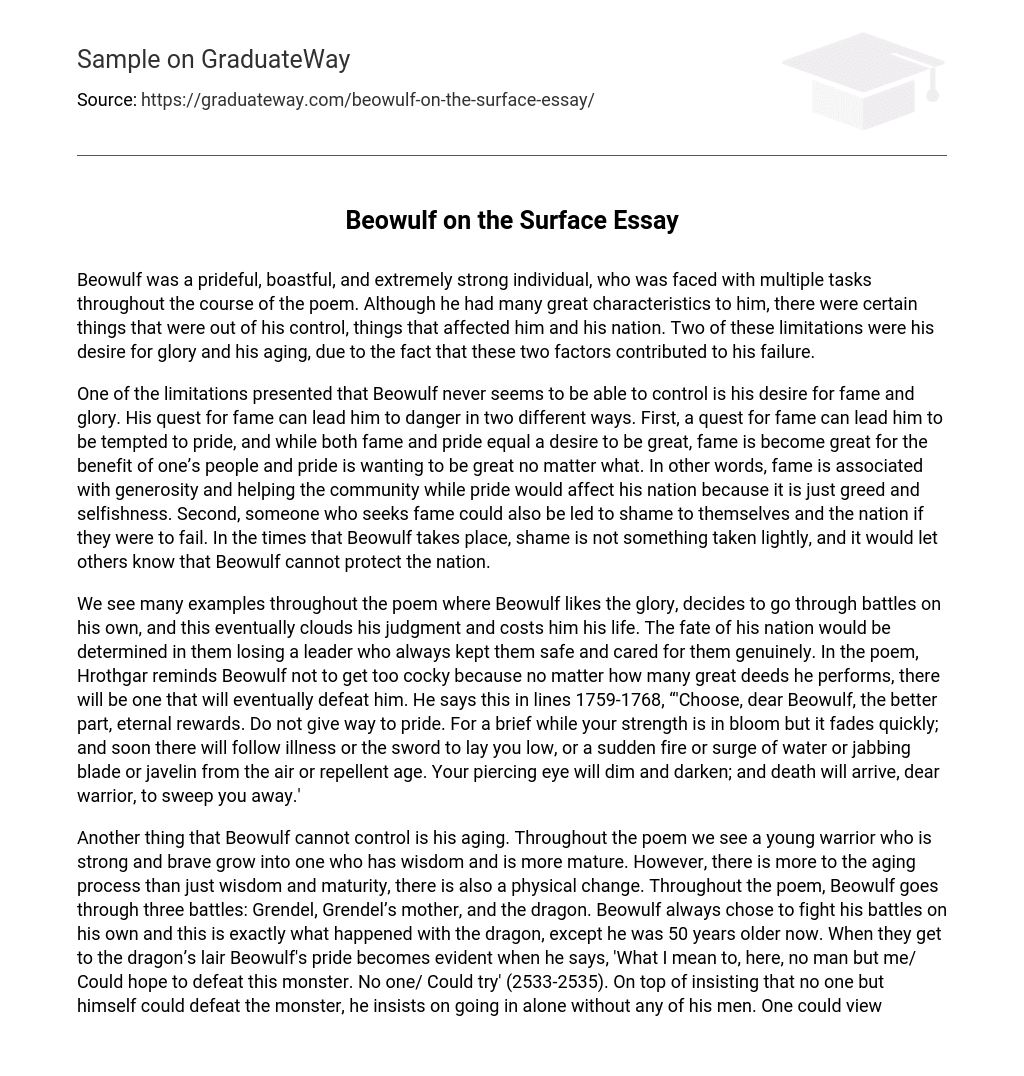Beowulf was a prideful, boastful, and extremely strong individual, who was faced with multiple tasks throughout the course of the poem. Although he had many great characteristics to him, there were certain things that were out of his control, things that affected him and his nation. Two of these limitations were his desire for glory and his aging, due to the fact that these two factors contributed to his failure.
One of the limitations presented that Beowulf never seems to be able to control is his desire for fame and glory. His quest for fame can lead him to danger in two different ways. First, a quest for fame can lead him to be tempted to pride, and while both fame and pride equal a desire to be great, fame is become great for the benefit of one’s people and pride is wanting to be great no matter what. In other words, fame is associated with generosity and helping the community while pride would affect his nation because it is just greed and selfishness. Second, someone who seeks fame could also be led to shame to themselves and the nation if they were to fail. In the times that Beowulf takes place, shame is not something taken lightly, and it would let others know that Beowulf cannot protect the nation.
We see many examples throughout the poem where Beowulf likes the glory, decides to go through battles on his own, and this eventually clouds his judgment and costs him his life. The fate of his nation would be determined in them losing a leader who always kept them safe and cared for them genuinely. In the poem, Hrothgar reminds Beowulf not to get too cocky because no matter how many great deeds he performs, there will be one that will eventually defeat him. He says this in lines 1759-1768, “’Choose, dear Beowulf, the better part, eternal rewards. Do not give way to pride. For a brief while your strength is in bloom but it fades quickly; and soon there will follow illness or the sword to lay you low, or a sudden fire or surge of water or jabbing blade or javelin from the air or repellent age. Your piercing eye will dim and darken; and death will arrive, dear warrior, to sweep you away.’
Another thing that Beowulf cannot control is his aging. Throughout the poem we see a young warrior who is strong and brave grow into one who has wisdom and is more mature. However, there is more to the aging process than just wisdom and maturity, there is also a physical change. Throughout the poem, Beowulf goes through three battles: Grendel, Grendel’s mother, and the dragon. Beowulf always chose to fight his battles on his own and this is exactly what happened with the dragon, except he was 50 years older now. When they get to the dragon’s lair Beowulf’s pride becomes evident when he says, ‘What I mean to, here, no man but me/ Could hope to defeat this monster. No one/ Could try’ (2533-2535). On top of insisting that no one but himself could defeat the monster, he insists on going in alone without any of his men. One could view this as Beowulf trying to protect his men (good of the people) or he was just being selfish. By going in alone Beowulf will achieve the greatest fame for himself if he slays the dragon but Beowulf’s death comes, and it was caused by a poisonous wound from the dragon. In reality, he died because his past and his pride blinded him to the reality that he was an aging king who could no longer perform the same feats of strength and bravery, making him a tragic hero. In the end, his nation lost their great hero, but they also ended with the dragon’s treasure.





